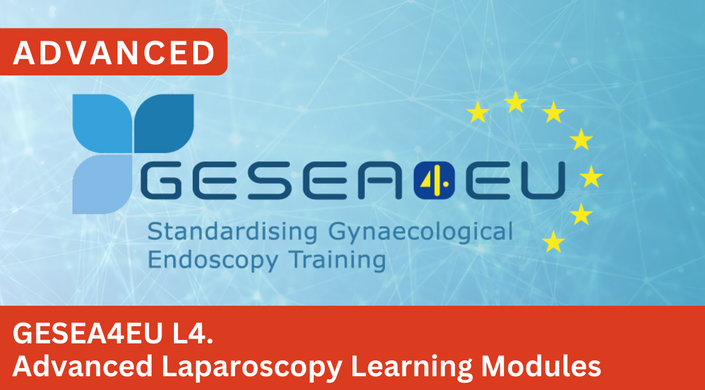
GESEA4EU L4. Advanced Laparoscopy Learning Modules.*
The advanced laparoscopy module is aimed at Specialist Professionals to provide them with knowledge in in four subspecialties: oncology, endometriosis, urogynecology, neuropelveology.
Enrolment in the course is only possible with a coupon.
To request a coupon please contact our team via [email protected]
Oncology e-learning
Objectives in terms of theoretical knowledge and topics:
- Laparoscopic anatomy of pelvic spaces, vessels and ureter
- Laparoscopic pelvic neuroanatomy: descriptive and functional
- Rules of exposure in laparoscopy
- Surgical rules of vessels dissection
- Surgical rules of ureteral dissection
- Surgical rules of pelvic nerves dissection
- Technique of total laparoscopic hysterectomy and radical laparoscopic hysterectomy
- Technique of pelvic and lomboaortic lymphadenectomies
- Principles of nerve sparing
- Intraoperative management of vascular and ureteral complications
Endometriosis e-learning
Objectives in terms of theoretical knowledge and topics:
- Laparoscopic anatomy of pelvic spaces, vessels and ureter
- Laparoscopic pelvic neuroanatomy: descriptive and functional
- Diagnosis approach in endometriosis regarding pain and functional disorders (urinary, digestive, sexual)
- Rules of exposure in laparoscopy
- Surgical rules of ureteral dissection
- Surgical rules of pelvic nerves dissection
- Different techniques to manage ovarian endometrioma
- Techniques of laparoscopic management in rectovaginal endometriosis (shaving, colorectal resection)
- Techniques of laparoscopic management in bladder and ureteral endometriosis
- ntraoperative and Postoperative management of vascular, digestive and urinary complications
Urogynecology e-learning
Objectives in terms of theoretical knowledge and topics:
- Anatomy and landmarks required for the surgery of laparoscopic POP repair. (promontory, lateral spaces, RV and VV spaces, Retzius space)
- Laparoscopic pelvic neuroanatomy: descriptive and functional
- Laparoscopic suturing in prolapse surgery
- Techniques of sacrocolpopexy and of lateral suspension (Dubuisson, pectopexy)
- Importance of nerve sparing approach
- Management of difficult cases
- Management of recurrences
- Prevention and treatment of complications
- Management of UI and POP surgery
- Technique of laparoscopic Burch colposuspension
Neuropelveology e-learning
Objectives in terms of theoretical knowledge and topics:
- Laparoscopic anatomy of somatic and autonomic pelvic nerves: descriptive and functional
- Architecture and microanatomy of peripheral nerve
- Diagnosis approach in pelvic pain and functional disorders (urinary, digestive, sexual)
- Surgical rules in peripheral nerve dissection
- Technique of nerve sparing according to surgical indications
- Technique and different type of neurolysis in endometriosis entrapment of somatic nerves
- Principles of pelvic neuromodulation
- Indications and technical principles of the implantation of neural electrodes on the pelvic nerves (LION procedures).
PLEASE VIEW BELOW THE FULL COURSE CURRICULUM
Course Curriculum
L4. Advanced Laparoscopy
Available in
days
days
after you enroll
-
StartEndometriosis e-learning: technical principles on DIE
-
StartEndometriosis e-learning: bowel endometriosis
-
StartEndometriosis e-learning: bladder endometriosis
-
StartEndometriosis e-learning: ureteral endometriosis
-
StartEndometriosis e-learning: extra-genital endometriosis
-
StartUrogynecology e-learning: standard technique of laparoscopic sacrocolpopecy
-
StartUrogynecology e-learning: lateral suspension techniques in laparoscopy
-
StartUrogynecology e-learning: management of complications in POP laparoscopic surgery
-
StartUrogynecology e-learning: laparoscopic native tissue repair
-
StartNeuropelveology e-learning: nerve sparing surgeries and surgical rules in peripheral nerve dissection
-
StartNeuropelveology e-learning: chronic pelvic pain and functional disorders: diagnostic approach
-
StartNeuropelveology e-learning: nerve etrapment by endometriosis, vessels etc: diagnostic and surgical management
-
StartNeuropelveology e-learning: principles of pelvic neuromodulation
-
StartNeuropelveology e-learning: LION procedures (laparoscopic implantation of neuropresthesis): indications and technical principles
